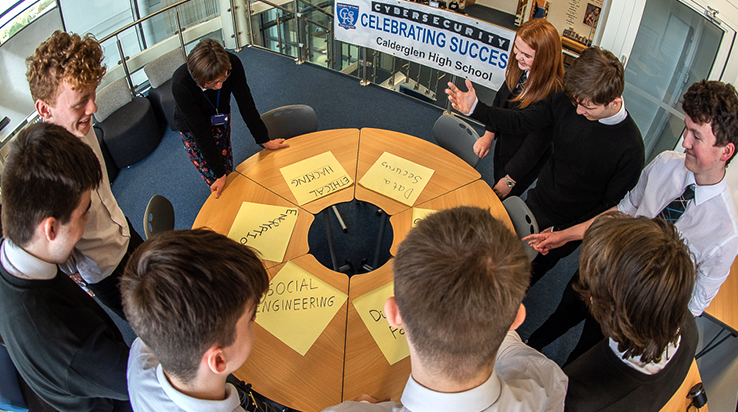
The Background
The Scottish Government laid out their vision for cyber resilience in 2015 and subsequently published the learning and action plan to support and enable this in 2018. One of the aims of this plan was to explicitly embed cyber resilience throughout the education system. Specific action was taken by the Scottish Qualifications Authority who launched National Progression Awards in Cyber Security. They are the first school-based national qualifications in cyber security to be developed and aim to support learners, preparing them for further studies and future employment in this area.
Calderglen High School in South Lanarkshire was one of the first schools to deliver the course.
The Vision and Challenge
When Calderglen High School initially delivered the course the practical elements were limited due to the nature of the content. Due to security policies, it was not possible to use network computers when implementing the Ethical Hacking unit and students were not able to fully experience the practical tasks that would have enhanced their learning.
Teachers wanted to offer a meaningful hands-on experience for students, but didn’t know what technical system to put in place to facilitate it. RM Education provide network support across all schools in South Lanarkshire Council and the challenge was passed to their technical experts to find a solution.
The Solution
RM created a virtual environment within Windows that was a sandbox and not on a live connected network. To create this safe environment RM configured and installed an application called Oracle VirtualBox (software that allows more than one operating system to run concurrently within a virtual environment). As well as the Oracle VirtualBox, RM sourced and configured three other software applications:
- Kali Linux penetration testing software
- Metasploitable. An intentionally vulnerable Linux operating system
- Windows XP. An early vulnerable version (pre server packs)
These three elements were configured to interact with each other in the virtual environment, including a virtual IP range. Once configured they were packaged and installed along with Oracle VB onto RM CC4 workstations in the computer labs. Students can now logon to their own CC4 workstation, launch the virtual environment and have access to a range of Ethical Hacking tools which meet the National Progression Award standards at Levels 4, 5 & 6.
The Results and Benefits
The experience of Ethical Hacking in a virtual environment has been particularly engaging for students. This technical solution is now rolled out across South Lanarkshire schools and has fundamentally improved students’ understanding of cyber security processes playing a vital role in Scotland achieving its cyber resilience goals.
Cybersecurity is a sector of industry where there is currently an acute shortage of experts. We are sowing the seeds, here and now, in Calderglen High, developing the skillsets of our young people to prepare them for future careers that are significant in the interests of national and global cyber security.
"The Scottish Government has laid out a clear and ambitious strategy to develop skills in cyber security and resilience. Starting to learn these skills at school gives students useful insight into both the subject generally and their own personal interest and aptitude. By implementing a technical solution that brings the subject matter to life and allows students to experiment directly, RM Education have added a huge amount of value to the classroom experience. The school really appreciate working with a partner like RM Education who can bring real depth of expertise in terms of both what technology can be implemented, and how it should be applied in a school environment."
Caithlin McConville, Computing Teacher and ICT Co-ordinator
Please click here to download the case study.